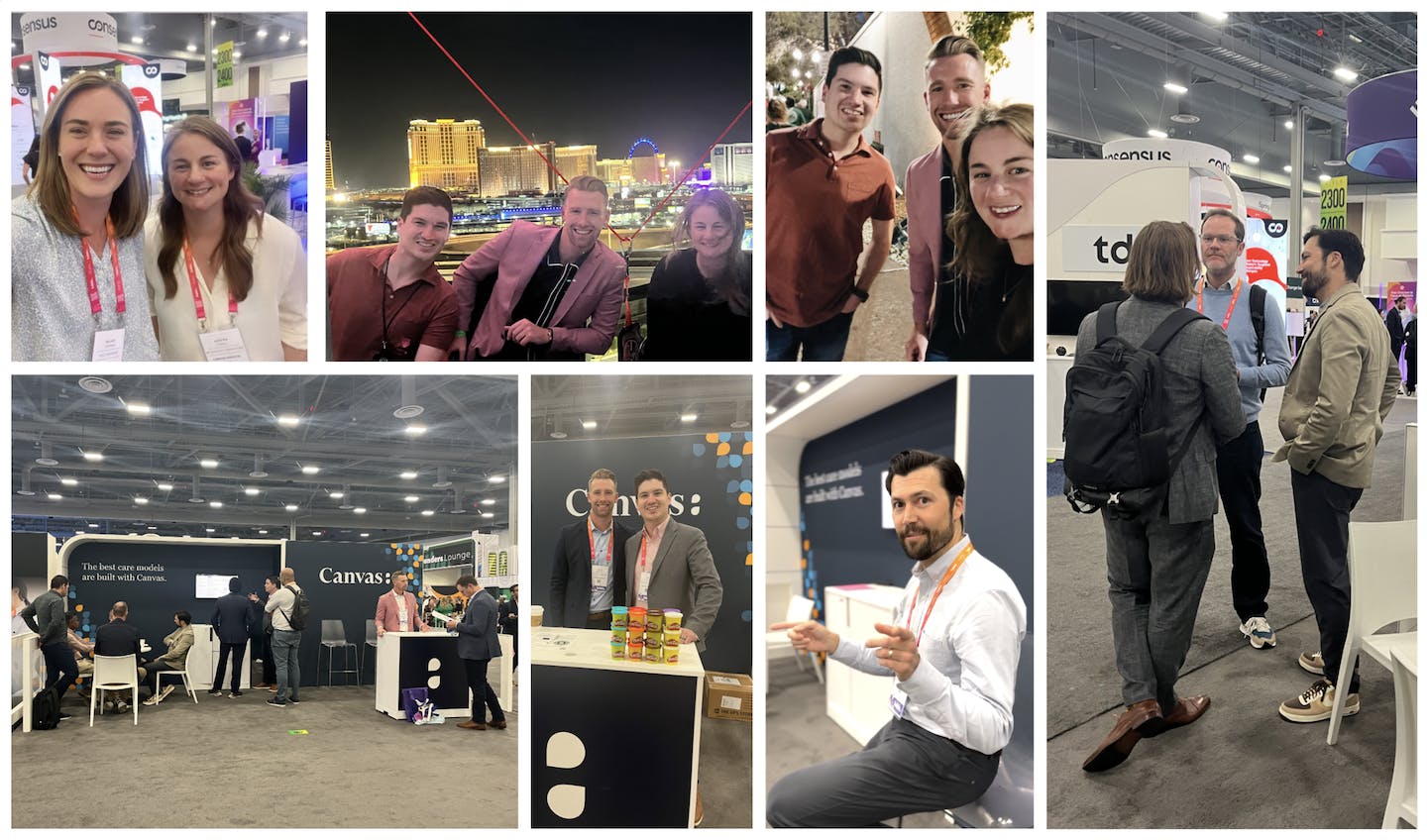Over 10,000 healthcare leaders met up in Vegas last week for the 6th annual HLTH conference. This was our first time sponsoring the event and it was, without a doubt, an incredible investment. The week was packed with thought-provoking conversations, heated debates, and so many opportunities for partnership in the quest to fix healthcare .
Here are some takeaways from our team.
Care Modeling In Action
At Canvas, we are on a mission to improve human health through clinician-developer collaboration. We believe that forward-thinking care delivery organizations will excel by making care modeling a core competency, enabling them to meet the unique needs of their patient populations and outperform their peers. The conference provided inspiring examples of various care models. Here are a few that stood out.
Reimbursement for GLP-1 Meds: Healthcare pricing and payments is a critical element of care modeling, as payer-provider incentives must be aligned and translated to easy to use workflows. The conference featured a passionate debate on whether employers should cover GLP-1 weight loss medications due to their high cost. GLP-1s are expected to have a significant impact on procedural volumes, chronic condition management, risk adjustment, and virtual care, but the healthcare system has yet to fully reckon with these effects. As a result many care models have surfaced to make the medication more accessible to patients.
Retail Healthcare Expansion: Retail giants like Walgreens, Walmart, and CVS are expanding their digital health offerings, including direct-to-consumer virtual care services. The findings presented by Walmart and Included Health were particularly exciting, highlighting the promise of virtual care. The initiative not only closed care access gaps in geographies linked to high emergency room use and low primary care use, but also reduced healthcare costs as demonstrated by reduced measures across total cost of care, hospital readmissions, and in-patient expenses.
Focus on Women's Health: Women's health took center stage at the conference, going beyond traditional areas like reproductive health. This makes sense, as women control 80% of healthcare decisions in the home, and the healthcare industry is reacting accordingly. Discussions included risks related to cardiovascular disease, which is the leading cause of death for women in the US.
Rise of Value-Based Care Enablers: Value-based care (VBC) enablers continue to grow rapidly, with Main Street Health securing significant funding and Wellvana becoming AdventHealth's exclusive primary care partner in Florida. VBC remains an important aspect of healthcare innovation.
AI's Transformative Potential
There was a significant focus on the potential of Generative AI in healthcare, particularly large language models, and much debate on the overall impact they may have, as well as when and where to apply them. There was an emphasis placed on the necessity of transparency in the deployment of AI models, especially in clinical applications, to ensure safety and equity. Participants were enthusiastic about AI's applications in healthcare, but stressed the importance of keeping the human element at the center of AI adoption to avoid misuse and maintain public trust.
At Canvas, we are bullish about the potential of AI applications in healthcare. Narrative charting was designed to lessen the friction of structured data collection while taking notes, resulting in a wealth of untapped data. LLMs, explained by one panelist as “essentially pattern recognizers”, can help unlock insights from that data and we are excited to see how our customers integrate their learnings into their care models.
Internally we are exploring using it to create data rich testing environments as well as exploring AI dictation solutions.
Being around so many smart people working towards the common goal of improving healthcare was a blast. Our team left Vegas excited about the discussions that were had and relationships that were built. If you couldn’t stop by our booth, we’d still love to hear from you.

